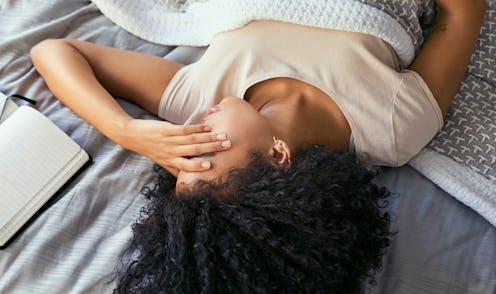News
How To Tell The Difference Between Anxiety Symptoms & Coronavirus

With the horrors of COVID-19 dominating the news, a lot of people are struggling with their mental health. Whether you’re worried about the wellbeing of yourself or your family, stressed about being cooped up inside for months, or just feeling weighed down by the strain of it all, many of us have seen our anxiety go through the roof over the past couple of months. But can anxiety mimic coronavirus symptoms (or vice versa?) Telling the difference between the two could be crucial for some people.
“When we are extremely anxious or under tremendous amounts of stress, we can develop physical symptoms that are not usually present in normal circumstances,” Dr. Li Li from Babylon Health tells me. “This is called somatization, a process where psychological concerns are converted into real bodily symptoms.”
Unfortunately, a lot of these symptoms can be similar to those shown by around 80% of people infected by COVID-19. Even more unluckily, anxiety about contracting the disease can cause your body to mimic symptoms difficult to differentiate from the virus. With this is mind, here's what to look out for when trying to tell the difference between anxiety and COVID-19:
Breathing difficulties
A common side effect of intense anxiety can be a shortness of breath or the feeling of a tight chest. However, this is unlikely to last over a prolonged period of time, which is very different to that of coronavirus. Dr. Tom Micklewright from the online medical service Push Doctor explains "symptoms of fast breathing, heavy sweating, or heart palpitations are not uncommon [during anxiety episodes]. However, the symptoms will gradually subside, either through deliberate relaxation, slow breathing, or by removing the trigger for your anxiety." In contrast, "when coronavirus causes breathlessness, this will feel constant rather than intermittent and may start preventing you from doing your usual daily activities."
Feeling hot
While hot flushes can be present during an anxiety episode (and are horrible to experience), Dr. Li Li says that there is a big difference between feeling hot due to anxiety and actually having a raised temperature due to coronavirus. A "key clue" in identifying COVID-19 is a "new onset intermittent or persistent fever of more than 37.8 degrees," she says, often accompanied with shivering, cold sweats or muscle aches.
Dry cough
Much like a normal winter cold or flu, a cough is one of the most common side effects of COVID-19. Some people with anxiety can develop a "nervous" cough, but Dr. Micklewright explains that a persistent dry cough is more likely to reflect something more serious. "The symptoms of coronavirus, although they may fluctuate in severity, will remain fairly constant," he says. "A new, continuous cough is more suggestive of a viral infection." Dr. Alberto Pertusa of Nightingale Hospital (a private mental health hospital in Central London, not the new NHS facility) characterises a continuous coronavirus cough as “coughing a lot over a one-hour period or three or more coughing episodes over a 24-hour period.”
Loss of taste and smell
While not officially recognised as a symptom of the illness, some people (young people in particular) have anecdotally reported on losing their sense of smell and taste due to COVID-19. Dr. Li Li says that this symptom is unusual for someone suffering from an anxiety episode, so it's unlikely to be related to that. However, that doesn’t mean to say it’s definitely COVID-19; a blocked nose could be a sign of a regular cold or springtime allergies such as hay fever. Plus, there are suggestions that a loss of taste and smell can be related to other mental health conditions such as depression, so it is worth considering whether that may be the explanation.
How to manage anxiety during the coronavirus outbreak
With COVID-19 at the centre of the news and our social media feeds, it’s normal to be feeling pretty anxious. To alleviate stress, Dr. Li Li recommends staying in contact with friends and family, keeping active, and practicing meditation to regulate emotions, improve concentration, and improve mental health.
“Self-care is an important part of managing anxiety,” Dr. Pertusa tells me. “Try to take time to eat well, maintain good sleeping habits, and connect with family and friends. Humour can also help, so watch a funny film, share some memes, or distract yourself with a good book or a hobby you haven’t been able to enjoy recently.”
What to do if you think you have coronavirus
If are you exhibiting symptoms of COVID-19, you should be taking measures to self-isolate. That means staying home, keeping away from any housemates and other people, and not going to a hospital, GP or pharmacy for at least seven days.
According to Public Health England, most mild symptoms are self-limiting and will get better over time. If after seven days of self-isolation you have no fever and feel better, you can return to your normal routine, although you should still avoid going outside for anything other than essential reasons. If you're symptoms are especially bad or have not improved over the seven-day period, you should visit the 111 COVID-19 online service. In extreme, life-threatening cases, you should call 999.
You can find all Bustle’s coverage of coronavirus here, and UK-specific updates on coronavirus here.
This article was originally published on